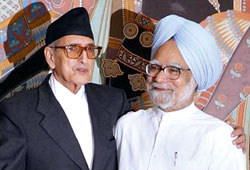 After King Gyanendra's disastrous coup in February 2005, India quietly began laying the groundwork to rollback the royal dictatorship. Its left parties and civil society were marshalled into bringing Nepal's mainstream political forces and rebel Maoists together to face down an intransigent king.
After King Gyanendra's disastrous coup in February 2005, India quietly began laying the groundwork to rollback the royal dictatorship. Its left parties and civil society were marshalled into bringing Nepal's mainstream political forces and rebel Maoists together to face down an intransigent king.
The strategy worked beyond Delhi's wildest dreams. By November that year, despite misgivings from the US, the seven-party alliance (SPA) and the Maoists had forged a formal partnership. By late April 2006, the royal dictatorship had completely collapsed in the face of people power stemming from that alliance.
Today, Nepal is four months into a peace process which was conceived in Delhi. While we may all have justifiable misgivings about foreigners playing an active role in Nepali politics, the hard fact is that it gave the SPA a new lease on life. But more importantly, the forces Delhi's diplomacy unleashed ultimately led to a sea-change in its foreign policy. For the first time in history, India had to quietly accede to a formal UN role in its neighbourhood, to Nepal's good fortune.
But today this peace process is at an impasse. It has become drawn out and dragged on the key issue of arms management. "A prolonged face-off carries the risk of a slow unravelling of the whole process," warns a diplomat who has closely monitored the process.
The face-off stems from the Maoists upping the ante by stating that their arms and fighters will not be cantoned until overarching political issues are resolved first. The rebels have threatened an urban uprising lest the demand is ignored.
Most of the SPA, on the other hand, is digging in its heels and wants the rebels to first resolve the arms management issue. Their spines have been strengthened by recent, and repeated, public show, of support from India and the US. Other major powers too, from the EU to Japan, have taken similar positions.
Clearly, the international situation is against the Maoists. It's little wonder that they are relying on domestic constituents-playing up the urban uprising threat-in hopes of forcing the SPA to sue for peace. "There's no question of returning to armed fighting," says Krishna Bahadur Mahara, the Maoists' chief negotiator. "But we will bring hundreds of thousands of people into Kathmandu to press our demands. We suspect the SPA is again joining hands with the king and army to wipe us out, and they are being aided by the Americans."
These threats are a concern for the SPA government. Even so, major SPA constituents are determined not to back down, shored up as they are by India, the US and the belief that Maoists lack widespread public support for their agenda. "We may have to call their bluff," says a senior SPA official. "If they resort to violence during the protests, we will have no choice but to use force."
This is a high-wire act which can go either way. As such, the next two months are going to be extremely significant in the history of the Nepali conflict. A little miscalculation from either side can re-ignite armed fighting.
Like everybody else, this has the Indians worried. Having helped forge the SPA-Maoist partnership, it wants to see the two sides resolve the conflict through negotiations. Indian policy-makers understand that their interests lie in a peaceful, stable and prosperous Nepal on its strategic northern border. But the Indians are also mortified by the possibility of Maoists gaining state power through arms (by not disarming, for example) and the bad example that would set for the numerous insurgent groups in their own country.
This fear is driving Delhi's new policy of bolstering the SPA negotiating position. They are joined at the hip with the Americans on this. But it is making the Maoists suspicious and forcing them to up the ante.
If the impasse is to be broken and potential disaster averted in the coming months, India needs to play a new role. The best way it can do that is by doing less. India needs to step back a little and allow the UN to build trust between the warring sides. Or, it should let the SPA and Maoists appeal to the Indian constituents that helped forge that alliance in the first place. Having helped conceive the baby, Delhi must now work to save it.



